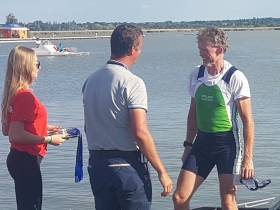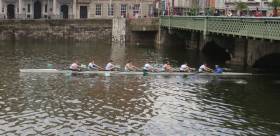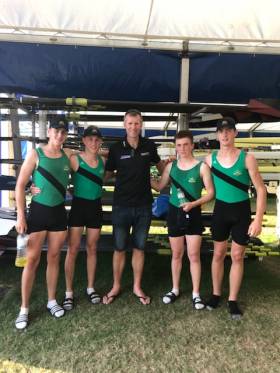Displaying items by tag: Neptune
Due to the weather forecast, both the Neptune and Commercial rowing regattas in Dublin have been cancelled. The organisers have cited strong winds of 45k/hr and gusts of 90k/ph expected to hit Islandbridge as the cause.
Beggan Best at Dublin Sculling Ladder Time Trial
#Rowing: Niall Beggan of Commercial won the time trial for the Dublin Sculling Ladder at Islandbridge today. His time of six minutes 53.87 seconds was over two seconds clear of his Commercial clubman, Mikey Campion, who was second. Beggan had also won in 2017. The fastest woman was Aoife Moloney, also of Commercial, with Neptune’s Claire Feerick second.
Crowley Leads Ireland to More Masters Wins in Hungary
#Rowing: Irish crews added four more wins to their haul over the weekend at the World Masters Regatta at Lake Velence in Hungary. The wins came on Saturday. Denis Crowley featured in a composite eight, which beat strong British opposition, and in a four – bringing his personal tally to eight wins. Brendan Smyth and Patrick Fowler of Commercial won in the double and Milo and Pat Murray of Cappoquin won the in the pair. A mixed eight finished second on Sunday.
World Masters Regatta, Lake Velence, Hungary (Selected Results; Irish interest; Winners)
Saturday
Men
Eight (E – avg 55 or more): Galway, Belfast BC, Neptune, Clonmel, Commercial, Shannon (G Murphy, A McCallion, K McDonald, D Crowley, F O’Toole, O McGrath, G O’Neill, C Hunter, M McGlynn) 3:04.90
Four (D – avg 50 or more): Commercial, Neptune (B Smyth, F O’Toole, G Murphy, D Crowley) 3:24.72.
Pair (F – avg 60 or more): Cappoquin (P Murray, M Murray) 6:12.10.
Sculling, Double (C – avg 43 or more): Commercial (B Smyth, F Fowler) 3:28.39.
Crowley a Six Shooter at World Masters Regatta
#Rowing: Denis Crowley of Commercial brought his tally of wins to a remarkable six after three days at the World Masters Regatta in Budapest. In just one day, the 57-year-old won in the coxless four and twice in the single sculls – in the C class (43 years or more) and the E class for 55 or more. The decision to form composite crews again paid off for the Irish, with wins in the C eight and the D coxed four, along with Crowley’s haul.
World Masters Regatta, Budapest, (Selected Results, Irish interest, winners)
Friday
Men
Eight
(C – 43 or more): Heat Four: Commercial, Cork, Neptune, Clonmel, Shannon, Galway, Castleconnell (B Crean, B Smyth, R Carroll, O McGrath, G O’Neill, P Fowler, B O’Shaughnessy, K McDonald; cox: M McGlynn) 3:09.75.
Four
(E – 55 or more) Heat Five: Commercial, Neptune, Belfast BC, Galway (D Crowley, G Murphy, C Hunter, A McCallion)
Four, coxed
(D – 50 or more) Heat 3: Galway, Neptune, Castleconnell, Clonmel (G O’Neill, O McGrath, B O’Shaughnessy, T Dunn; cox: M McGlynn) 3:35.89.
Sculling, Single
(C - 43 or more) Heat 19: Commercial (D Crowley) 3:49.92.
(E – 55 or more) Heat 8: Commercial (Crowley)
Irish Composite Crews Lead the Way at World Masters
#Rowing: A composite of five crews – Galway, Neptune, Commercial, Clonmel and Cork – won in the men’s eight for 50 and over at the World Masters Regatta in Budapest. It was one of a sequence of wins for the Irish at the huge event.
Brendan Smyth and Patrick Fowler, rowing for Commercial, won the Pair in the A class, while Denis Crowley and Tony Corcoran won in single sculls.
Two C fours (43 or more) won and an E coxed four (55 or more) also took the honours.
World Masters Regatta, Budapest, (Selected Results, Irish interest, winners)
Wednesday
Men
Four, coxed E (55 or more) – Heat Four: 1 Belfast BC, Commercial, Galway, Leichhardt RC (C Hunter, A McCallion, M Heavey, G Canning; cox: JM Marks) 8:05.40
Thursday
Men
Eight (D – 50 or more) – Heat Two: Galway, Neptune, Commercial, Clonmel, Cork (B Crean, B Smyth, R Caroll, O McGrath, G O’Neill, P Fowler, D Crowley, G Murphy; cox: M McGlynn) 3:05.06.
Four (C – 43 or more): Heat Three: Commercial, Galway, Clonmel, Neptune (R Carroll, O McGrath, P Fowler, G O’Neill) 3:15.28. Heat Six: Commercial/Neptune (D Smyth, F O’Toole, G Murphy, D Crowley) 3:15.54.
Pair (A – 27 or more): Heat Three: Commercial (P Fowler, B Smyth) 3:32.68
Sculling, Single – (D – 50 or more) – Heat 15: Commercial (D Crowley) 3:55.15.
(H – 70 or more) – Heat Eight: 1 T Corcoran 4:27.08.
#Rowing: The Afloat Rowers of the Month for April are the Enniskillen girls’ and boys’ junior 18 eights which won at Commercial and Neptune regattas, respectively. The young women won the final race at Commercial, beating the hosts in a fine contest which drew the curtain on more than two days of action at Islandbridge. Enniskillen’s boys’ junior 18 eight had beaten Coláiste Iognáid at Neptune regatta on the Saturday.
Enniskillen’s fine run recently has included outstanding placings in the Schools’ Head of the River in London, where the girls placed fourth and the boys sixth – and sixth fastest overall.
Rower of the Month awards: The judging panel is made up of Liam Gorman, rowing correspondent of The Irish Times and David O'Brien, Editor of Afloat magazine. Monthly awards for achievements during the year will appear on afloat.ie. Keep a monthly eye on progress and watch our 2019 champions list grow.
Commercial Best at Dublin Head of the River
#Rowing: Commercial took first and second at the Dublin Head of the River today. UCD took third. The fastest women’s crew was Trinity's senior eight and Commercial were the fastest women's junior 18 eight. Neptune’s boys formed the fastest men’s junior crew. Seventeen eights competed in the official race, with a number of crews also taking to the water on a time-only basis.
Dublin Head of the River, Saturday (All Eights; Selected Results): Men – Senior Eight: Commercial A 10 minutes 54 seconds. Inter: Neptune 11:35. Club: Commercial 12:53. Junior 18: Neptune 12:05. Masters: Neptune 13:08.
Women – Senior: Trinity 12:57. Intermediate: Trinity 14:07. Club: Neptune 14:19. Jun 18: Commercial 13:45.
Championship Records Tumble at National Rowing Centre
#Rowing: Records fell in race after race in the final Saturday session of the Irish Championships. The Skibbereen senior quadruple of Fintan McCarthy, Aodhan Burns, Kealan Mannix and Jake McCarthy smashed the Championship best of 5:59.10 as they won in 5:50.696.
The Shandon junior quadruple of Eoin Gaffney, Luke Hayes-Nally, Jack Dorney and Alex Byrne – all set to compete at the World Junior Championships – set a new time of 5:58.26. This beat the old Championship record of 6:07.97.
In both cases the crews were bettering times set by their own club.
Lisa Dilleen’s win in the women’s senior single scull was emphatic. The Cork Boat Club sculler set a Championship course record of 7:34.282, bettering Monika Dukarska’s time of 7:35.07.
Ronan Byrne of UCC took the intermediate single, under some pressure from Niall Beggan of Commercial. Byrne’s time of 6:55.898 bettered Kealan Mannix’s time of 7:03.51, set last year.
Enniskillen took the women’s junior eights, in 6:30.753, bettering their own time from last year of 6:36.24.
In the women’s senior pair, Aine McCarthy and Niamh Casey shattered the old Championship record of 7:23.78, setting a new time of 7:17.176.
Joan Poh of Neptune also won the club single sculls in a new record. The old figure was 8:09.22. Poh won in 8:06.13.
UCD continued their fine run in eights by adding the men’s novice title to the intermediate one.
Irish Championships, Day Two (Selected Results)
Men
Eight – Inter: UCD 5:43.70. Novice: UCD 6:03.599.
Four – Junior, coxed: Enniskillen 6:22.66.
Sculling, Quadruple – Senior: Skibbereen 5:50.696. Jun: 1 Shandon 5:58.26
Single – Inter: UCC (R Byrne) 6:55.898. Club: Carlow (F O’Driscoll) 7:25.3.
Women
Eight – Novice: Queen’s 7:04.49. Jun: Enniskillen 6:30.75.
Pair – Senior: Skibbereen 7:17.18.
Sculling, Double – Inter: Skibbereen 7:09.09. Single – Senior: Cork BC (L Dilleen) 7:34.28. Club: Neptune (J Poh) 8:06.1. Jun: Coleraine GS (M Curry) 7:53.46.
Seeded Crews Give Irish Rowers Tough Time at Henley
#Rowing: Trinty lost out to Syracuse University and Neptune to Gloucester at Henley Royal Regatta today. Both victors were seeded crews; they were much heavier than their rivals from Ireland.
For the Temple Cup, Trinity lost William Doyle to a back injury after the first race and flew in Sean Canning, who replaced him. They came up against one of the top-ranked American crews in orange-clad Syracuse, who justified favouritism with a pillar-to-post win.
In the Fawley for junior quadruples, Neptune never gave up, but they, too, were fighting a losing battle from early on. They made Gloucester work – but the English crew were stronger.
Henley Royal Regatta, Day Two (Selected Results; Irish interest)
Thames Cup (Eights, Club): Cork Boat Club bt London RC ‘A’ 1 ¾ l.
Temple Cup (Eights, College): Syracuse University (US) bt Trinity 2½l; Yale University (3 D Lynch) bt Bath University 2¾ l.
Fawley (Quadruple, Junior): Gloucester RC ‘A’ bt Neptune 1 1/3 l.
Double Sculls (Open): S Cox, T Oliver bt JJP Keech and JA Dunley 1 ¼ l.
#Rowing: Shandon’s intermediate eight were the fastest crew at the Metropolitan Regatta today. Commercial’s intermediate eight scratched, but UCD’s club one eight gave the young Corkmen a good race – until the final few hundred metres, when Shandon flew away. All of the Shandon crew are junior 18 athletes.
As had been the case in the first session, young rowers came home first in race after race in the superb conditions. Lara Brown of New Ross added the Division One single sculls title to the doubles win she had recorded with Shona Tierney.
Metropolitan Grand League Regatta, Blessington, Saturday (Selected Results; course length between 1750 and 1800m)
Men
Eight – Division One: Shanddon (intermediate) 4:57.91, 2 UCD (club one) 5:02.20. Div Two: Neptune (club two) 5:40.496.
Four – Div One: Commercial A (sen) 5:36.26. Four, coxed – Div One: 1 Commercial (sen) 5:55.01, 2 Shandon (jun 18A) 5:55.99, 3 Commercial (inter) 5:56.41; 5 UCD (club one) 6:02.82. Div Two: UCD A (club two) 5:50.77, 2 Shandon (jun 18B) 5:57.32
Pair – Div One: Commercial (inter) 6:07.65, 2 Commercial (sen) 6:14.6. B Final: 2 Castleconnell 6:25.78; 4 Belfast RC (club one) 6:43.92.
Sculling, Quadruple – Div Two, coxed: Shandon (jun 18B) 5:53.59, 2 Neptune (nov) 5:56.17, 3 Neptune (club two) 5:56.73.
Double – Div One: Castleconnell (jun 18A) 5:47.98; 6 Belfast RC (club one) 6:18.11. Div Two: Cappoquin (club two) 6:03.10; 2 Neptune (jun 18B) 6:03.44. B Final: Commercial C 6:44.69. Single – Div One: Shandon (J Dorney; jun 18A) 6:34.78, 2 St Michael’s (D O’Connor; sen) 6:37.81. B Final: Three Castles (T McKnight; inter) 6:47.52; 5 Commercial (J Casey; club one) 7:11.88. Div Two: Neptune (T Orlic; jun 16) 6:47. 76, 2 Clonmel (O’Donnell; club two) 6:49.48, 3 St Michael’s (O’Gorman; jun 18B) 7:00.84.
Women
Eight – Div Two: UCD (club two) 5:57.43; 4 Commercial (jun 16) 6:39.69. Four, coxed – Div Two: Neptune (club two) 6:56.77.
Pair – Div One: Castleconnell (jun 18) 7:14.24.
Sculling, Quadruple – Div Two, coxed: Commercial (jun 16) 6:51.87, 2 Neptune (club two) 6:54.06, 3 Fermoy (nov) 6:54.57; 6 Commercial (jun 18B) 7:49.09.
Double – Div One: New Ross (jun 18A) 6:43.13; 3 Neptune (club one) 6:48.66; 4 St Michael’s (sen) 7:05.97. Div Two: Carlow (jun 16) 7:11.58, 2 Neptune (club two) 7:36.47.
Single – Div One: New Ross (S Tierney; jun 18A) 7:06.03; 3 Garda (J Ryan; inter) 7:13.48. Div Two: Neptune (J Poh; club two) 7:18.24; 3 Three Castles (E Irwin; jun 16) 7:33.89.




























































